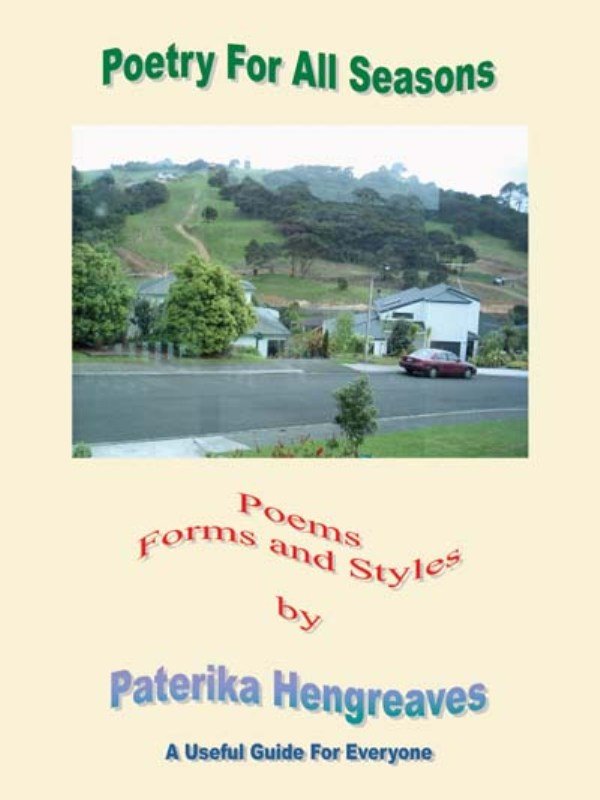Author's Comments
Oh, there are so many different types of Quatrains. These are some of the names that readily come to mind not listed in alphabetical order:
The Introverted:
A quatrain having an enclosed rhyme which has abba rhyme scheme. The Introverted Stanza may also be called envelope rhyme since the rhymes of the first and last lines enclose the other lines.
Ballad Meter:
Alternating lines of iambic tetrameter and iambic trimeter, with the last words of the second and fourth lines rhyming, an abcb rhyme scheme.
Curtal Quatrain:
A quatrain in which the fourth line is shortened
Common Measure (C.M.):
An iambic stanza form similar to ballad measure. It is a quatrain in alternating iambic tetrameter and trimeter with rhyme scheme abcb. To put this differently, C.M. consists of four iambic verses making a stanza, the first and third having each four feet, and the second and fourth each three feet.
Curtal Long Hymnal Stanza:
A stanzaic form composed of three lines of iambic tetrameter and one of iambic dimeter rhymed abab.
Envelope Stanza:
Quatrain rhymed abba. The Redondilla is an example
In Memorium Stanza:
An envelope stanza (rhymed abba) in iambic tetrameter
Long Hymnal Stanza:An iambic stanza form similar to ballad measure. It is a quatrain in alternating iambic tetrameter and trimeter with rhyme scheme abab. A slight variation on Common Measure.
Long Measure (L.M.):
Quatrains in iambic tetrameter with ryme scheme abcb. To put this statement another way, L.M. consists of iambic verses of four feet each, four verses usually making a stanza.
Quaternion:
Of English origin, it is a 12-line 3-quatrain poem with fixed rhyme scheme. Rhyme scheme set at aabb ccdd abcd.
Short Meter (S.M.):
Iambic verses, the first, second and fourth having each three feet, and the third four feet. The stanza usually consists of four lines, but is sometimes doubled.
Redondilla:
This Spanish verse form is written in tetrameter in which each stanza consists of four lines, each with eight syllables and with any of these rhyme schemes: abba, abab or aabb.
Rubaiyat (Rubaa-ey)
This is the Persian word for quatrain and is a collection of poems attributed to the Persian mathematician and astronomer, Omar Khayyam (1048-1123). The rhyme scheme is aaba, that is, lines one and two and four. In longer poems built in rubaiyat rhyme scheme, the connection is sometimes extended to AABA BBCB CCDC, and so on. This is sometimes called, naturally, "interlocking rubaiyat." The structure can be made cyclical by linking the unrhymed line of the final stanza: ZZAZ. A pure use of the interlocking rubaiyat in Modern English poetry is Robert Frost's poem, "Stopping by Woods on a Snowy Evening."
Heroic Stanza:
A quatrain consisting of two heroic couplets written in an elevated style; the rhyme scheme is abab. The heroic couplet consists of two rhymed linesof iambic pentameter and written in an elevated style.
Pantoum:
The Pantoum is composed of a series of quatrains, the second and fourth lines of each stanza are repeated as the first and third lines of the next.
This pattern continues for any number of stanzas, except for the final stanza which differs in the repeating pattern.
The first and third lines of the last stanza are the second and fourth of the penultimate, the first line of the poem is the last line of the final stanza, and the third line of the first stanza is the second of the final. Ideally, the meaning of lines shifts when they are repeated although the words remain exactly the same: this can be done by shifting punctuation, punning, or simply recontextualizing.
There is the Imperfect Pantoum, in which the final stanza differs from the form stated above, and the second and fourth may be different from any preceding lines.
Venus and Adonis Stanza:
A stanza consisting of iambic pentameter quatrain and couplet with the rhyme scheme ababcc. The stanza was so called because it was used by William Shakespeare in his poem, "Venus and Adonis" (1593). Its form is like the structure for the Sesta Rima which is a six line stanza composed of a quatrain and a couplet and rhymed ababcc.
Kyrielle:
This is a Medieval French form written in rhyming couplets (though often arranged in quatrains) and featuring repeated lines or refrains. An example of a Kyrielle is Thomas Campion's poem, "A Lenten Hymn." These are some of the possible rhyming schemes for Kyrielle constructed in quatrains, aabB, ccbB and abaB, cbcB (uppercase letters signify the refrain). In the original French Kyrielle, lines were generallly octosyllabic. In English, the lines are generally iambic tetrameters.
Octameter in poetry is a line of eight metrical feet. It is not very common in English Verse. See example below
Trochaic: "The Raven" by Edgar Allan Poe
Dactylic: A.C. Swinburne's poem, "March: An Ode."
Nostradamus prophetic quatrains:
The Frenchman, Michael de Nostredame (December 14, 1503 - July 2, 1566) wrote in quatrains published in his book titled "Les Prophetics" (The Prophesies). This book contains his collection of major, long-term predictions. The quatrains featured both rhymed and unrhymed verses.
Shichigon-Zekka:
This is the Japanese term for a poetry verse form (often of Chinese origin) consisting of four phrases each seven Chinese characters (kanji) in length. This is the most common form of classical Chinese poems (kanski) and the standard form of Shigin (Japanese chanted poetry).
In composing Shichigon-Zekku, the character of the phrases (Zekku) is important. The rule is as follows:
First phrase (Kiku): Depiction of the scene
Second phrase (Shoku): Add further illustration and detail to the Kiku
Third phrase (Tenku): By changing the scene of the action, reveal the true essence of the poem
Fourth phrase (Kekku): In assimilating the tenku draw together and complete the poem
The Japanese terms mean literally: bringing into being, understanding; changing and drawing together.
As can been seen, the Quatrain is the most popular stanzaic form. It must consists of four (4) lines usually in a rhyme scheme of abab or in any of the following variants:
aaba
aabb
abba
aaba
abcd
The significance of the quatrain lies in the fact that it can be easily memorized because it contains only four lines of verse. It is intimately concerned with feelings. It‘s like a short story by which the poet can express thoughts easily.
All the stanzas in the poem, "The Westerlies" are quatrains. Click on the link below or at right to read the poem in its entirety. Your comments are appreciated greatly.











No comments:
Post a Comment